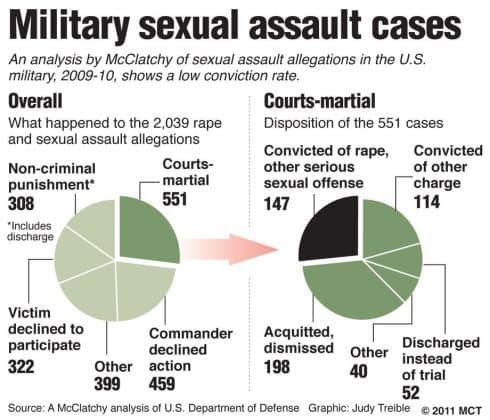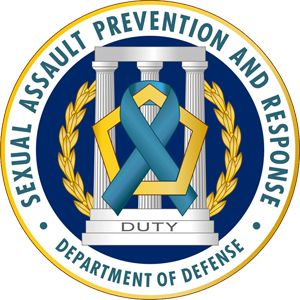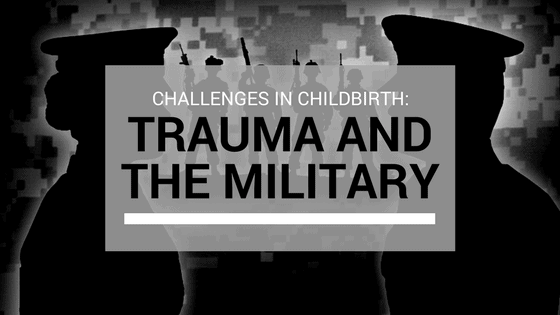Challenges in Childbirth: What You Need to Know About Trauma and Military Veterans
Guest post by UDA Vice-President Rachel Winsley
Most people in our community know that I am a combat veteran, and have worked to support women in childbirth, breastfeeding, and peaceful parenting for many years. What you may not know is that I am also someone diagnosed with Post Traumatic Stress Disorder (PTSD) and Military Sexual Trauma (MST). My experiences have enabled me to truly empathize with the unique set of challenges many women face throughout their childbearing and breastfeeding years.
What is Military Sexual Trauma?
Military sexual trauma results from an unwelcome sexual advance on the military person without implied consent while on active duty. You may not know, but sexual assault is underreported in the 
Military Training on Sexual Assault: The Bystander Effect
The Sexual Assault Prevention and Response (SAPR) Program is responsible for oversight of the Department of Defense’s sexual assault policy. Sexual Assault Prevention and Response Office (SAPRO) works hand-in-hand with the Armed Services to educate, 
What does this mean for you and your client?
Abuse issues are sometimes triggered unexpectedly during pregnancy, labor, and birth. Intrusive thoughts or flashbacks to the abuse and unconscious body memories (i.e. tension, anger, sick feelings, or physical manifestations) arise when someone is triggered. There are several potentially triggering experiences that may arise during the birth process. As a doula, you can help to alleviate and navigate through these instances if you are prepared and knowledgable about PTSD and MST. There are tools to understanding and empathizing with the anxious mind.
It is not necessary to be told about abuse or trauma in order to provide sensitive and effective care. While being able to discuss personal history openly is helpful, your client may not be at a point in her healing process where this is possible or constructive. Your client hired you, because she trusts and values your skillset, and the way she feels around you.
Your words matter. The language our society uses to refer to people shapes its treatment and beliefs about them. Words are powerful! Antiquated, inaccurate, and inattentive descriptors create barriers to quality care. When we describe people by their labels of medical or psychological diagnoses, we devalue them as individuals. In contrast, using thoughtful terminology builds trust. Read more about how to use person first language, here.
Examples:
-
Diagnosis First: “My MST client is strong and capable. She has everything she needs within her.”
-
Person First: “Rachel copes well with Military Sexual Trauma, and she is a strong capable woman. She has everything she needs within her.”
-
Diagnosis First: “Your ‘tubie’ is a cute little cuddler and a fighter. You’ll be out of the NICU soon.”
-
Person First: “Baby Alice is tube feeding great! What a fighter. You’ll be out of the NICU soon.”
Fostering Resilience in Childbirth and Beyond
Many doulas find that connection is the antidote to anxiety and a disordered labor pattern. Finding connection and vulnerability looks different for each person, but here are some tried and true suggestions for fostering resilience in the birth space.
Bonding with Baby
When your client, diagnosed with PTSD or MST, connects with her baby, she is doing two very important things. She is developing a sense of awareness within her body and creating space for positive feelings surrounding her child. This is a powerful coping tool, and it also mitigates her increased risk for postpartum depression. When I was pregnant, my favorite way to connect with my own baby was to sing, read, or write letters to my baby. I set time apart everyday to do this, and even now when my child is upset we sit down to connect in the same way. Listen to Penny Simkin, a world renowned doula, and her thoughts on this very practice.
Mindfulness & Affirmation
If birth could feel like a violation, how can the birthing person feel in their body that this is different — that there is a purpose? You can work to pinpoint with your client the root of the violation. At that point, designing affirmations and mindfulness practice around those discoveries can be a powerful tool. There are several Mindfulness-Based Stress Reduction (MBSR) workbooks that you might find to be a helpful tool. My favorite are “A Mindfulness-Based Stress Reduction Workbook for Anxiety” and “Get Out of Your Mind and Into Your Life: The New Acceptance and Commitment Therapy“. These are a good preparation for childbirth and processing trauma during the postpartum period.
Here are some examples of affirmation.:
-
Consent: “I will be choosing to work with my baby as we spread my pelvic bones wide for his/her descent.”
-
Motive/Intention: “This baby was created from an act of love, as is giving birth.”
-
Safety: “My people are there to protect and support me. ______ stands watch at the door to guard me and my baby.”
-
Power: “I will give birth. I am in control, and my provider hears me.”
Creating a plan around the fear
Many people who struggle with PTSD and MST will experience a seemingly insurmountable wall of anxiety when they are triggered. Consider changing your focus from management of pain to management of anxiety. Most childbirth preparation classes teach techniques to manage pain through mindfulness, breath, hypnosis, etc. Your client can use the same and similar techniques to practice coping with anxiety. This technique and mindset works like a muscle. Your client will respond best to the technique she is most comfortable practicing. There is no wrong way to mentally, physically, emotionally, and psychologically prepare for the intensity of labor.
At a certain point, usually in transition, the intensity of labor can become a distraction from managing anxiety, and therefore presence of mind. Create a plan around your client’s fears, and design a birth environment where losing control and being fearful will be accepted without judgement. Anyone in the birth space should be able to ‘be with’ fear. Encourage your client to talk to the baby through fearful moments. This takes us back to connection, back to the present, and back to the goal.
Communication
It may be helpful to ask your client, “How do you usually cope when you are stressed out?” This question can reveal if it is important that she stay in the present or dissociate in order to cope. Depending on the answer, you might explore ways you can support her in staying present or help her to turn inward and cope from within. In my own personal doula practice, eye contact, firm pressure on her shoulders, squeezing her hand, etc., are all ways I have found to bring the birthing person back if she has “checked out,” or is dissociated and not communicating. Having this conversation ahead of time can prepare you to effectively and empathetically meet your client’s needs in the birth space.
If your client wants to use medication as a tool, encourage the family to research what that might be like. I have a Google Drive folder dedicated to activities, graphic organizers, and conversation starters to aid my clients in decision making and communication. Thinking through potential decisions and their implications can help us cope with the risks and benefits of any choice we may make in the birth space.
The postpartum visit
Every doula has a different philosophy around birth and the postpartum period, and this philosophy shapes the way the client processes a birth and bonding experience. Thoughtfully explore which tools are most relevant in the postpartum visit. You might think about doing a fear release, listening to the birth story, preparing a meal, etc. This visit is a good time to ground your client in connection, honor the journey you’ve embarked on together, and watch for warning signs of struggles ahead. If your client seems to be anxious, make sure basic needs are met first.
Local resources for your client
- Veterans of Foreign Wars – This is a social club and support group for combat veterans.
- American Legion – This is a social club for all military people who have served during a time of war.
- The Vet Center – This is a resource for combat veterans seeking treatment for trauma and PTSD.
- Veterans Administration in Salt Lake City – The VA in Salt Lake City has a women’s only clinic and recreation therapy options. They provide access to retreats, a sweat lodge, yoga, mindfulness and coping classes, etc.
Read More:
- After Fire
- The Invisible War
- Podcast with Brittany Huckabee
- When Survivors Give Birth
- Survivor Moms: Women’s Stories of Birthing, Mothering and Healing after Sexual Abuse
- The Radical Doula Guide
- The Lonely Soldier: The Private War of Women Serving in Iraq
- Silenced No More: The Courage of a Soldier – Life After Military Sexual Trauma
- Honor Betrayed: Sexual Abuse in America’s Military
- Mel’s Story: Surviving Military Sexual Assault
- Local Advanced Training: Supporting Survivors
Rachel Winsley is a combat veteran, DONA trained doula, childbirth educator (ICEA), La Leche League leader, and birth story author. She is also the current vice-president of the Utah Doula Association. Rachel has extensive experience empowering laboring women to make their own choices and decisions throughout the labor process. Learn more about Rachel on her website.
Editor’s note: Rachel is a strong proponent of music therapy as a therapeutic modality. It is an important coping tool for her and others with PTSD and MST. Music therapists work with clients to help them manage a wide range of emotional, social, and physical difficulties, using music as the tool for change. To learn more about music therapy with military populations, click here . Locally there are several music therapists, who can be found on the Utah Association of Music Therapy website. Rachel recommends Harmony Music Therapy and Heart Tones Music Therapy & Birth Services.



Thank you so much for this. As a survivor of sexual assault myself, I know how important it is that women feel safe and empowered. I would love to work more with this population.
Thank you Rachel, serving our military is such a rewarding job for me. My husband was a Sea Bee and most of my family has been involved in one branch or another so for me it’s a way of giving back. We offer lots of different classes along with birth Doula work and extra postpartum care for mothers of deployed partners.
http://Www.themermaidswomb.com
wonderful and necessary page! Thank you. These beautiful survivors deserve a Doula to empathize, understand, LISTEN and above all; know and respect any and all triggers she may have throughout her entire journey. Prental and postnatal support will never been more crucial than with a mumma like this…. I would be truly honored to support and empower any woman throughout her transition. Niki xo
https://www.facebook.com/Doulamadejustforyou/
As a doula who specializes in working with families that need more mindful support, I was moved by how much you put into this post. We need more women writing about this. Thank you so much 😊
Wow, the personal experience and powerful information you’ve shared here is so valuable. Thank you for this incredibly thoughtful post. Every birth worker should have this information no matter what capacity they serve in!
We primarily support military families and all of our doulas are military affiliated and we are always looking for doulas near any major military installation in the United States.
Stars and Stripes Doulas
http://www.starsandstripesdoulas.com
We have supported so many clients that had some of the very things you have mentioned. Supporting a family who experiences PTSD is very specific and can require a different mindset like you mentioned. Thank you for putting this information out there. ❤️
Very good article! Good set of images!